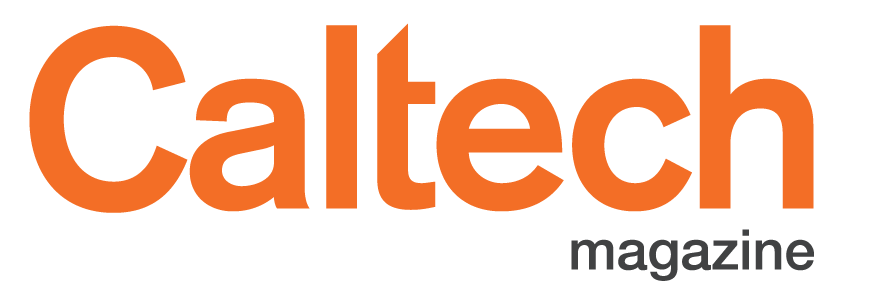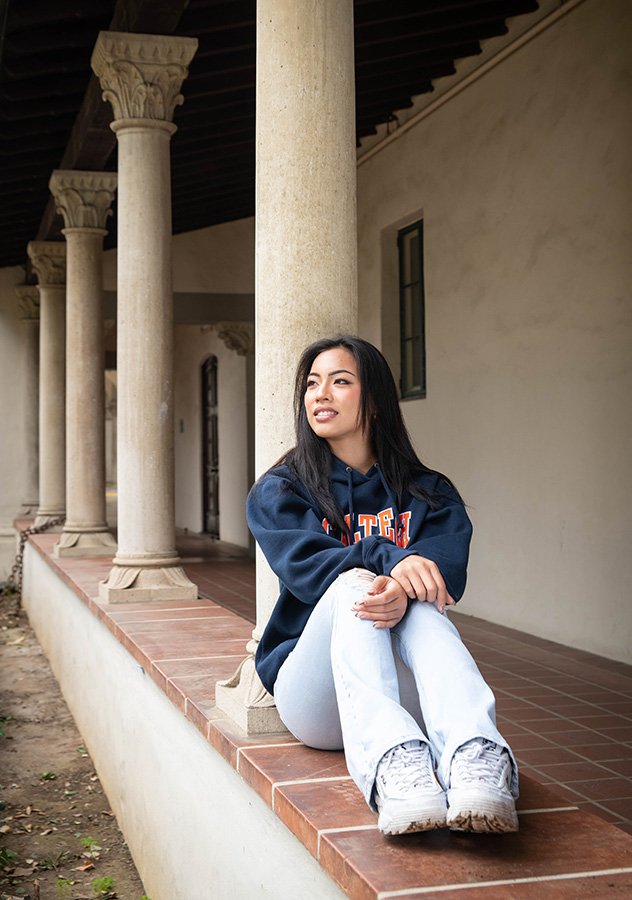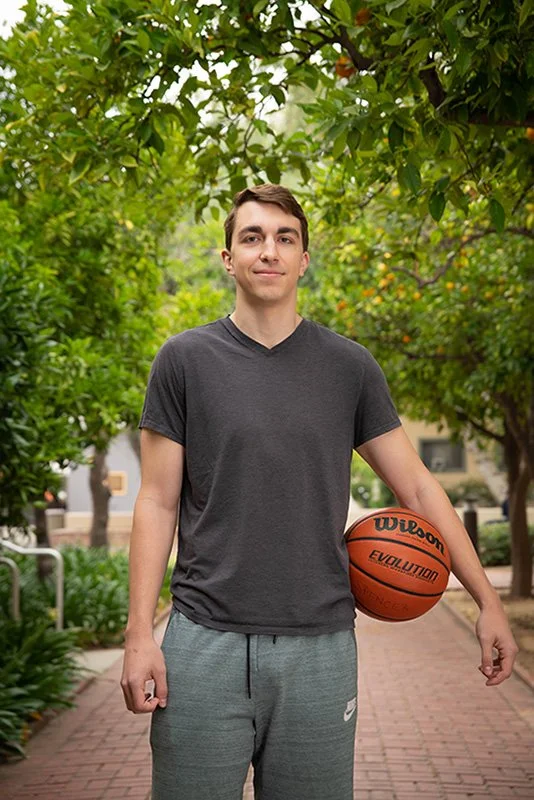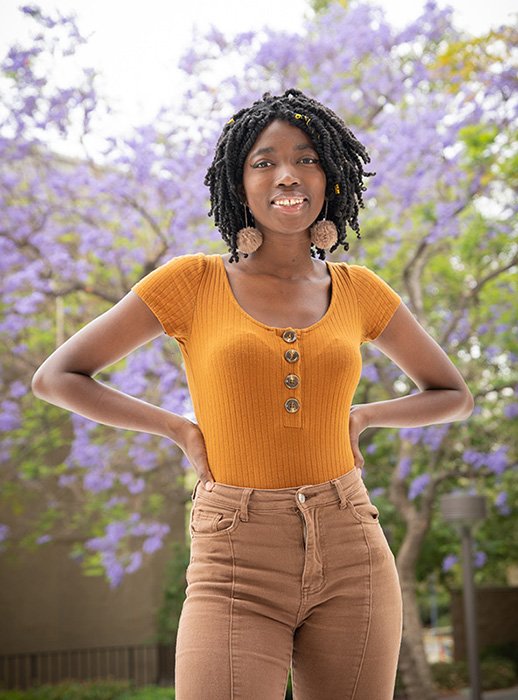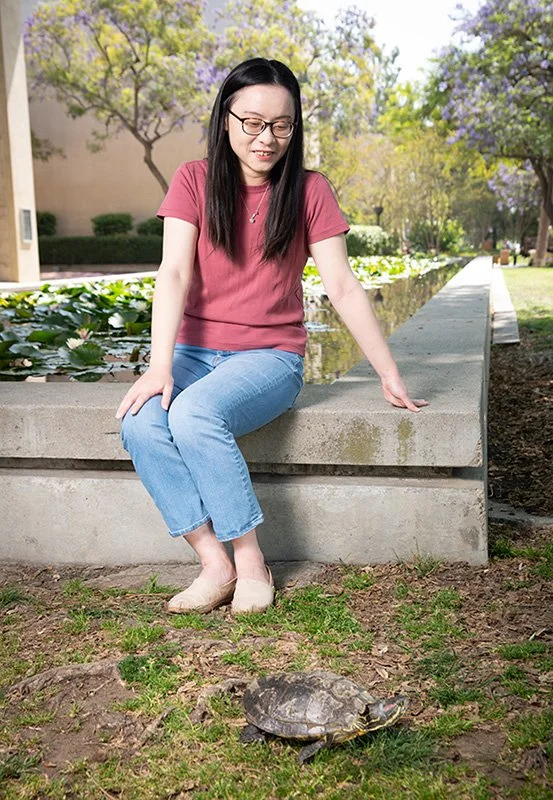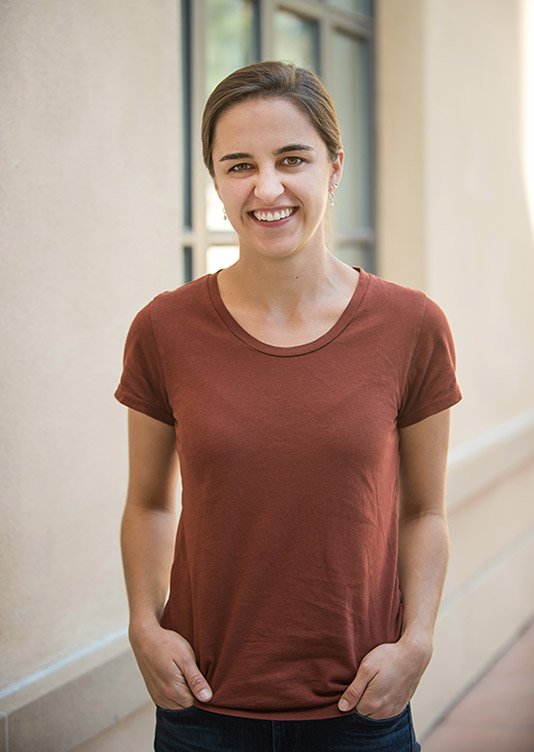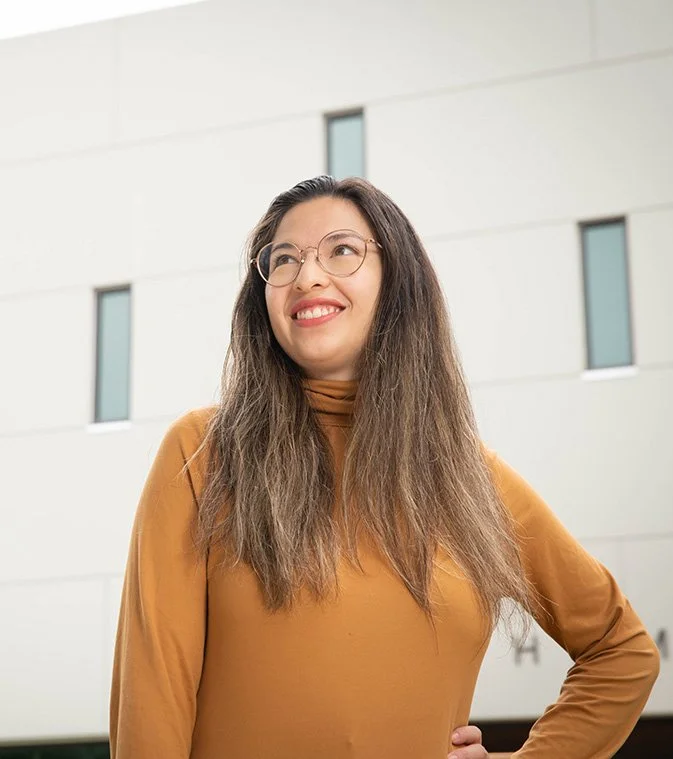Getting Personal With Caltech’s Newest Alumni
New Caltech alumni discuss how their lives have changed due to the COVID-19 pandemic, and what’s on their minds as they approach Caltech’s first in-person commencement in three years.
Photo: Lance Hayashida/Caltech
In the best of times, a Caltech education requires an enormous amount of hard work, dedication, and resilience. But you’d be hard pressed to find anyone who would describe the last two and a half years as the best of times. The COVID-19 pandemic brought new challenges to the lives and work of the Caltech community, and students at the Institute have handled these stressors in different ways. Here, some of Caltech’s newest alumni reveal how they turned negative situations into opportunities for positive growth, but they also get frank about what it meant to endure a pandemic during their time at the Institute.
Photo: Lance Hayashida/Caltech
Katherine Rinaldi
PhD, chemistry
Rinaldi defended her PhD thesis in 2021, but is participating in this year's in-person commencement. She works at renewable-energy company H2U Technologies.
How has the pandemic impacted you?
It was hard, but I was lucky. I had done all my experimental work, and I was doing system-modeling work on my computer. As far as a direct impact on my work, it was pretty minimal. But doing a Zoom defense online was weird. From a personal interaction standpoint, dealing with the pandemic was hard. And with so much going on in the world, it was hard to concentrate on my work. It was also hard to be separated from my family, who live on the East Coast. Trying to navigate how to maintain relationships and keep connections with people was a challenge. I think the pandemic laid bare how important connections with other people are, and how important communities are. I got involved with the Graduate Student Council's effort to get affordable health care for graduate students from Caltech. I learned how important it is to get organized. My experience at Caltech was made much brighter because of the other grad students and the people trying to make Caltech a better and more welcoming place for everyone.
What does it mean to you to have an in-person commencement?
That will be exciting because I didn't get the big celebration last year. My parents are coming, and my friends who have graduated over the last year are walking. It's going to be like a big party.
Photo: Lance Hayashida/Caltech
Diego Olaya
BS, physics
Olaya will pursue a graduate degree in physics at the University of Colorado at Boulder.
What effect has the pandemic had on you?
It feels like a lot of the seniors are making up for lost time this year. I'm trying to strengthen a few friendships that I'm hoping might last after I graduate. Many of my social interactions this year are partly colored by the fact that seniors are all going to graduate in relatively short order. To some degree, that means if I'm given the choice between taking an extra class that is somewhat interesting or leaving that space in my schedule for unstructured flexible time, I'm going to take the latter. Whereas, perhaps in more normal times, I would've taken the former.
What does it mean to you to have an in-person commencement?
Were we to graduate virtually, all of the traditions celebrating the achievements of the senior class and how each house sends off its seniors would have been gone. Things like Ditch Day, Interhouse, rotation, and even how the houses interact with prospective students when they come visit, are passed down from class to class by experience and repetition. For example, some houses have not had an Interhouse that anyone younger than us remembers. Our class is the only class currently on campus that has ever had an in-person Ditch Day. Those are extremely valuable parts of the Caltech experience that we came very close to losing. Thankfully, we didn't.
Photo: Lance Hayashida/Caltech
Isabell Yang
BS, biology
Yang will work as an EMT before applying to medical school.
What effect has the pandemic had on you?
Having more free time at home forced me to confront some mental health challenges that I had put off due to the rigor of Caltech studies. I am much better at understanding what I need to live a healthy and balanced lifestyle. I am kinder to myself and give myself the time to take a break without feeling guilty, and that helps me to be so much more productive. I already knew I wanted to go into health care, and I wished I could already be helping people out, especially when so many people were struggling.
Did you ever talk to anyone about what you were going through?
After my freshman year, when I was going through those struggles, I was pretty transparent with my volleyball coach, Tom Gardner, because that was when I decided I was going to take a gap year. I said, “I really enjoy playing for Caltech, but I don’t know if I can continue.” He was really supportive. He wanted what was best for me, and it didn’t seem like he only cared about the team. Since then, when I got back, we’ve been really close, and I was chosen to be a team captain. The other captains and I talk with him often about how the team is doing and what their energy and attitude is like. All of that made us really close.
What does it mean to you to have an in-person commencement?
In my freshman and sophomore years, I couldn’t imagine finishing at Caltech. My focus wasn’t on graduating, it was just on taking it one day at a time, one assignment at a time. I think I won’t realize how big of a deal it is until I’m actually at the ceremony and receive my diploma.
Photo: Lance Hayashida/Caltech
Spencer Schneider
BS, computer science; business, economics, and management (double major)
Schneider will work at Meta as a software engineer.
What effect has the pandemic had on you?
It's made me a lot more reflective. I took a year off. I got to live on my own, work with the Washington Wizards as a software engineer, and get a taste of the adult world. It made me more appreciative of the unique things in college, like getting to wake up whenever you want and deciding to do your work whenever you want. In general, I’m trying to live in the moment and appreciate the situation I am in now because it can change at any moment. I'm OK doing my own thing a lot more, especially since the majority of my friends have graduated. I had a lot of time to figure out what I wanted to focus on when I came back to school. This past year, I took a lot of project courses because I feel they’re relevant to the skills that I want to develop. I was more focused.
Did you miss being around your teammates?
A hundred percent. I tried to get virtual events going, to play Among Us, hop on Discord or Zoom, or watch a movie. But it's hard. Everyone has different schedules. People are in different time zones. I was the captain, and I feel like I didn't do a great job of that. It's still something I think about. The coaches also reached out and tried to keep in touch. This past season, making the program better, getting to a point where we were a contender in conference was really rewarding. I enjoyed going to practice every day—even the bad parts were a little more fun.
Photo: Lance Hayashida/Caltech
Ayooluwa Odemuyiwa
BS, computer science
Odemuyiwa will work at Meta as a software engineer.
As ASCIT president in 2021-22, how did you help other students adjust not only to life at Caltech, but to life at Caltech during a pandemic?
There were a lot of first years enrolling without knowing anything about the school, and it was really hard to reach a lot of them. I was an FCC [Frosh Camp Counselor] during orientation. I saw a lot of them burning out and not really feeling connected to the school. A big thing for me was trying to find ways to engage them, to make them feel connected, and make them feel like actual students. Some things we did were to make a first-year support committee, and we also connected them directly with upperclassmen by setting up lunches with them over Zoom.
What were your biggest challenges during your time at Caltech?
My first year at Caltech, I really struggled. First, because of my high school, my academic background wasn't as strong as some other students’. Second, I'm a Black student, and I struggled moving from an area where there were a lot more Black students and more Black people in the community. I struggled mentally with stress and depression, imposter syndrome, and also just navigating Caltech. I wouldn't ask for help, and I would try to prove to people that I knew everything when everyone else would be asking for help and working with others.
Were you able to find help on campus?
Yes, as part of the Freshman Summer Research Institute at Caltech, I connected with Monique Thomas and Taso Dimitriadis in the Caltech Center for Inclusion and Diversity (CCID) office. I reached out to Monique, who’s a Black woman, and talked about my experiences and was very honest with her about how I was feeling. Lee Coleman [from the counseling center in Student Wellness Services] was also very helpful. He visited me and talked to my mom. Also, the deans, Kristin Weyman and Lesley Nye. They were very supportive when I had to take some time off for a couple weeks. The TAs and professors were accommodating during that time and helped me get on my feet. Understanding that school is hard and that I was going to struggle was my biggest realization that came from the first year. The support I received from faculty, staff, and others really taught me the importance of giving back to my community through leadership service, and I went on to serve as ASCIT president, in Ricketts house leadership, and with the Black Scientists and Engineers at Caltech.
Did you find a home here at Caltech?
Absolutely. Caltech has definitely trained me to be someone who’s acutely aware of the importance of representation in STEM and also just the importance of understanding that you don't know everything. And once you acknowledge you don't know everything, you can do anything.
Photo: Lance Hayashida/Caltech
Shrikeshav Deshmukh
BS, mechanical engineering (minor in environmental science and engineering)
Deshmukh will work at SpaceX as a Starlink engineer.
Was there a moment that crystallized the gravity of the pandemic for you?
At the beginning of the pandemic, I was sitting in Browne Dining Hall having lunch. The TVs were flashing with all this information on COVID. I was one of the last people to leave campus, so it felt like a ghost town. That's when I realized, wow, this is the real deal. Later on, Caltech said we were not going to have fall term in person. I then realized this could go on much longer than we had originally thought.
What effect has the pandemic had on you?
I used to be on the track and field team, but COVID gave me time to consider if I really wanted to continue the sport that I had been doing for nearly a decade. It was a very difficult decision to leave, but it allowed me to pursue other opportunities that I’ll only find at Caltech and allowed me to get more involved in project classes, robotics, and dance. Dance was just a hobby before, but since returning to campus, I’ve spent much more time on it and now lead the Dance Team. I’ve learned a lot of different styles and am even teaching my own classes, which I would not have imagined I’d do four years ago. After being off campus for so long, I really try to make the most of every moment I have left before I graduate.
What does it mean to you to have an in-person commencement?
In-person commencement drives home a feeling of accomplishment, marking the end of my chapter here at Caltech. It means a lot to me, as it cements the feeling that I'm transitioning from one era of my life to another.
Photo: Lance Hayashida/Caltech
Yanting Han
PhD, neurobiology
Han will work as a postdoc in the lab of Ralph Adolphs, Bren Professor of Psychology, Neuroscience, and Biology at Caltech.
Did the pandemic alter the focus of your research?
The pandemic probably had a positive influence on my research rather than negative. I study human emotion experiences by evoking emotions using stories and videos, and collecting self-report ratings from participants. During the pandemic, I co-led the COVID-Dynamic Longitudinal Study, which tracks people’s psychological changes during the pandemic in multiple domains, including emotion and mental health, decision-making, attitudes and beliefs, and so on. We realized that it would be nice to take advantage of the opportunity and sample naturally occurring emotions in people’s daily lives in addition to the evoked ones. This allows us to study those emotions in comparison to the evoked ones and in the specific context of real-world events. Although this is still early stage exploration, we’ve already seen many interesting things. For instance, collectively, moral disgust went up for George Floyd’s death, and surprise went up around Election Day.
Did the pandemic change the way you go about your research?
The nature of my research allowed me to make progress without having to go to the lab. Data collection using crowdsourcing platforms is a new trend in my field. It’s much easier to reach a diverse sample of participants, and to get the data quicker. It comes with challenges as well. I had to monitor the studies and answer questions all day long, and to act fast and solve problems as they arose. For example, the site we used for recruitment became completely unusable at one point, and we had to manually provide study links to every single participant.
Was there a particular moment over the last two years that crystallized the gravity of the pandemic for you?
I come from China, so I was aware of the coronavirus earlier. I had planned to go back home and visit family for the Spring Festival in January 2020, which I always do. But I canceled the flight, knowing what was going on in Wuhan. At the time, I wasn’t seriously concerned that it would become a global pandemic. But by March, I remember it was difficult to get masks. When we did get masks, it felt uncomfortable to wear them in public even though it was obviously the correct thing to do.
Photo: Lance Hayashida/Caltech
Ella Watkins-Dulaney
PhD, bioengineering and biomedical engineering
Watkins-Dulaney now works as lead protein engineer at Aralez Bio, an offshoot of the laboratory of Frances Arnold, a Nobel laureate; the Linus Pauling Professor of Chemical Engineering, Bioengineering and Biochemistry; and director of the Donna and Benjamin M. Rosen Bioengineering Center.
What effect has the pandemic had on you?
Pre-pandemic, I was overcommitted, and every week felt like a hectic whirlwind. Lockdown felt disorienting, like the sensation of stepping off a treadmill. I slowly realized that I had been using my busy lifestyle as an excuse to avoid some serious introspection. I have arrived at a place where my work and how busy I am do not define my self-worth. Work is important, but life comes first.
Have you had to change the way you go about your research, or has the focus of your research changed at all?
When we finally got to resume in lab, we used a shift system, so all our lab members could safely conduct their research. I got to work in lab between 6 a.m. and 2 p.m. The silver lining of these restricted hours was that it allowed me to spend my afternoons giving undivided attention to analyzing data and carefully planning the next steps of the project. I matured as a scientist, with improved resource and time management, because I just couldn’t afford to waste any time in the lab.
What does it mean to you to have an in-person commencement?
Having an in-person commencement means the world to me. My husband, Austin Dulaney (PhD ’21) remotely defended his thesis in December of 2020 and was not able to attend his commencement. I defended my thesis remotely in June of 2021. Defending your thesis in person is a rite of passage that we missed out on. We didn’t get to bring coffee and cookies, or feel the excitement of walking out to our friends and family afterward, or pop champagne in the building where we spent five years of our lives.
Photo: Lance Hayashida/Caltech
Forrest Graham
BS, mechanical engineering (minor in English)
Graham will work at renewable energy company Heliogen as a mechanical engineer.
What effect did the pandemic have on your academic pursuits?
Before, I had been stressed out a lot about grades and taking a lot of classes. My focus was not as much about learning as it was finishing the work and getting as good a grade as possible. With remote classes, I reignited some of my passions. I enrolled in an English minor and took a ton of classes that I enjoyed. When we were on pass/fail, I was able to not worry whether or not I was getting something correct, but try to learn in the best way possible.
So the humanities played a positive role in your Caltech experience?
I'm happy that I've been able to work it in fairly smoothly into my major, and the best relationships I've formed with my professors have been in the English department. It's much easier to build these relationships when you're in a class of five to 10 people, and you're sitting with them for a few hours a week talking about these interesting topics. I've really enjoyed that. But I think people miss out on it, and it's not necessarily their fault. Depending on what major you're in, your class schedule could be really tough, and you don't have the mental energy to focus on more than you have to for your major. That is kind of a big issue and something that's not really easy to solve.
Photo: Lance Hayashida/Caltech
Cora Went
PhD, physics
Went, who defended her thesis in March 2022, currently works as a research associate at Rewiring America.
What stands out to you about your Caltech experience?
I worked in the lab of Harry Atwater. He is one of the best photovoltaics researchers out there, but there's also such a breadth of research happening in his lab: everything from how we make liquid fuels more sustainable to the fundamental physics of new materials. The flexibility to follow your interests was incredible. I never had to worry about funding and I wasn't tied to a specific grant, so I could explore different research areas. Some of my research was on ultrathin, lightweight solar cells. Later, I became interested in policy and bigger-picture research. I learned how to estimate the cost of a new technology from the ground up, which helped me get a dream job at Rewiring America.
What about outside of academics?
In 2018, I co-chaired the first Future of Physics conference with [Caltech] physics professor Dave Hsieh. We brought 33 undergraduate women to campus for a workshop on applying to grad school and what the grad school experience is like. I'm so happy to see that that program has expanded to be Caltech-wide and to focus on racial and gender diversity. Then, I did some work with Women in Physics, Math and Astronomy and also with Caltech for Black Lives, following the petition by the Black Scientists and Engineers at Caltech. Seeing how Caltech responded to that petition and seeing the positive changes has been exciting.
What effect has the pandemic had on you?
It was an isolating experience to be away from my friends, to not see people in the lab or be able to walk down the hall and ask someone a question. During the pandemic, I realized that I didn't want to do lab-oriented research long term. In fall 2020, I joined the Sunrise Movement, Los Angeles, which is a youth climate activism group. I got put on a SoCal building electrification coalition that was working on switching all of our homes to be heated by electricity rather than natural gas. I became passionate about electrification as a solution to the climate crisis.
What does it mean to you to have an in-person commencement?
I actually can’t go, because I’m getting married that Saturday to my fiancée, Emily Wyatt (PhD ’18)! It was one of the only dates available. We were originally getting married in 2021. With COVID, we pushed it back a year.
Photo: Lance Hayashida/Caltech
Eva Scheller
PhD, geology
Scheller plans to work as a postdoctoral researcher at MIT as the recipient of a Heising-Simons 51 Pegasi b Fellowship.
What effect has the pandemic had on you?
I’m an international student from Denmark. Half of my family lives there, and half of my family is in China. I couldn’t go home for a pretty long time to Denmark, and now that China is closed back down (Editor’s note: interview conducted in April 2022), I can’t get back to see my grandparents.
What did you miss the most while working remotely?
There was a whole period where we couldn’t do experimental work, and a huge part of my thesis is experimental work, so it made me take a step back and focus on computation. When I’m working with the younger grad students in my group, it’s a pretty close mentorship. It was very hard without in-person communication. It’s nice, now, to have a more relaxed way of checking in with each other and building a personal relationship.
What does it mean to you to have an in-person commencement?
Coming from the school system in Denmark, I’ve never been to a commencement before, and I have to figure out the robes and hat. I look forward to it!
